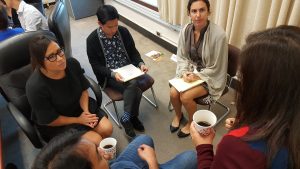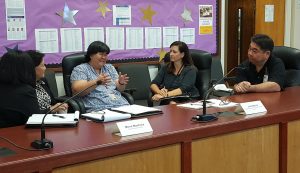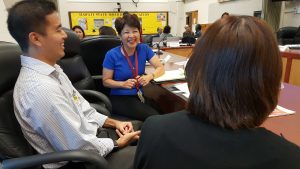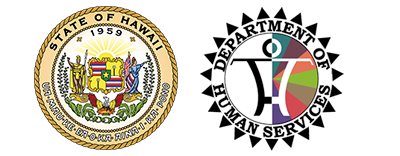Whether through provision of DHS benefits, programs, and services or the support provided to the divisions and agencies that deliver them, our collective commitment is the same: to improve the well-being of Hawai‘i’s families. Our implementation of ‘Ohana Nui aims to make strategic, intentional changes that enables us to reach our commitment even more effectively. ‘Ohana Nui is based on national data and best practices that a multigenerational philosophy of service delivery is more effective than one that separately addresses individuals’ needs. This column will bring you strategies, success stories, and regular updates as we work across the department to intentionally create better outcomes for Hawai‘i through ‘Ohana Nui.
We Want You!
“We want you! We want you! We want you as a new recruit!” Often paired with a red, white, and blue graphic of Uncle Sam, this slogan from years gone by recruited volunteers for armed forces. This timeless, undeniable call to action remains relevant to us today here at the Department of Human Services (DHS).
We want you! We want you! We want you…for ‘Ohana Nui!

DHS Team Members broke into small groups during the kick-off to talk about how Ohana Nui relates to our work.
DHS Director Pankaj Bhanot has shared with many of us the concept of ‘Ohana Nui and how it will transform the way we do business. This month, we operationalize this message with the department-wide roll-out of ‘Ohana Nui. We started last month by convening the Advisory Group (comprised of division administrators, staff officers, and executive directors of our attached agencies and commissions), who will provide the leadership and guidance for this initiative.
‘Ohana Nui is a proven approach that capitalizes on Hawai‘i’s unique multigenerational family structure and provides a framework for human service delivery that positions whole families for a chance at greater well-being. Translated as extended or large family, ‘Ohana Nui is an adaptation of the national two-generation approach. The approach addresses the needs of children, parents, and grandparents early and concurrently, resulting in better outcomes for the family. Practically speaking, this new philosophy requires us to tear down our silos, think beyond the limitations of funding streams, and work across divisions, programs, and teams. It may even require policy changes.

Leadership from across the department joined the kick-off event, ensure representation from divisions, staff offices, attached agencies and commissions.
Supporting the implementation of ‘Ohana Nui will be the new IT Enterprise System. The Enterprise System will more quickly determine applicant eligibility for benefits and services across our divisions and programs, regardless of the program, division, or “door” one enters for DHS support.
While ‘Ohana Nui resonates with our team and may even seem like a “no-brainer,” integrating it throughout DHS will not be easy. It will fundamentally change the way we do business. This is why we want you.

We are even including community in our plans moving forward, including Scott Fujii, executive director of PHOCUSED (left)
We need you to be part of this process. We ask you to look at what we do each day through an ‘Ohana Nui lens. Think about how a multigenerational approach would benefit the clients you serve and how this whole-family approach might change the way you do your work and collaborate with your colleagues. How can you make adjustments to incorporate ‘Ohana Nui into the way you do business?
We’re asking you to bring ‘Ohana Nui into everything you do, whether you work on the front lines delivering benefits and services to clients or support our line staff and the department as a whole. ‘Ohana Nui will improve the well-being of Hawai‘i’s children, adults, and kūpuna – Hawai‘i’s families. In the end, isn’t that why we – the Department of Human Services ‘ohana – come to work everyday?
